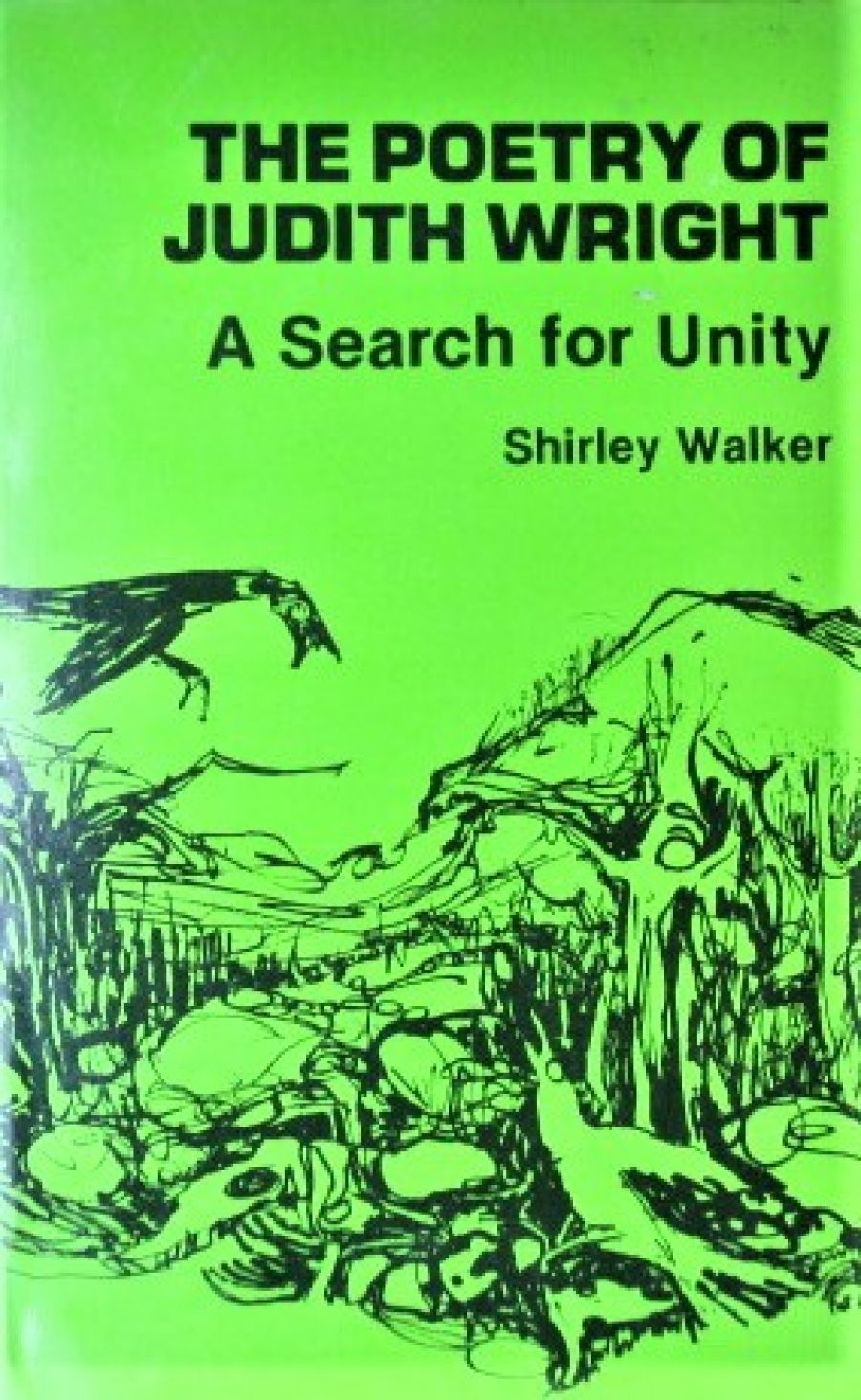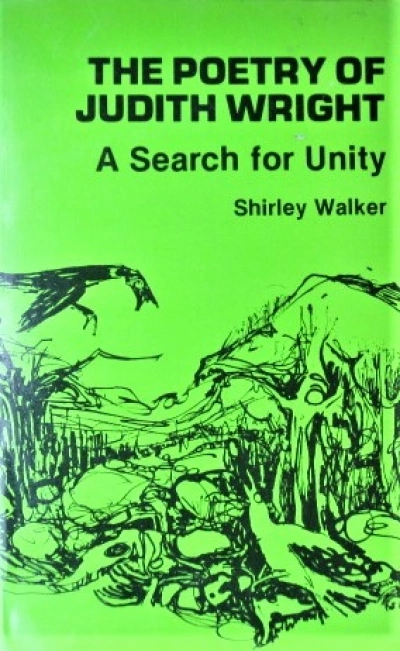
- Free Article: No
- Contents Category: Poetry
- Review Article: Yes
- Article Title: A Poet in Philosophy
- Online Only: No
- Custom Highlight Text:
In one way, this is a book to unnerve the teaching academic: it is so eminently cribbable. As a ‘handbook’ of Wright’s poetry, it ranges widely rather than intensively, offering lucid expositions and firmly delivered judgements. If these latter are sometimes, by the nature of the book, more asserted than demonstrated, they nonetheless seem usually sound and sensible: the lines quoted from ‘The Watcher’ do indeed ‘attempt, and fail, to wrest a response from the stereotyped symbols of the matriarchate’; ‘Christmas Ballad’ is banal; Fourth Quarter does represent ‘a newer and more vigorous poetic world’ than Alive.
- Book 1 Title: The Poetry of Judith Wright
- Book 1 Subtitle: A search for unity
- Book 1 Biblio: Edward Arnold $14.95 pb, 194 pp
- Book 1 Cover Small (400 x 600):

- Book 1 Cover (800 x 1200):

It is the very soundness, the lack of identifying eccentricity in opinion or delivery that may make what she says easily ‘lifted’ by future essay-writers. However, this is churlish stuff: students could actually do a lot worse than assimilate her detailed discussion of, for example, ‘Gum-Trees Stripping’, ‘The Wattle Tree’, or ‘By the Creek’ and essay-markers will simply have to deposit this one in their memory-banks.
More seriously, it is churlish because the book is after all not merely a handbook. It offers discussion of a kind not seen often enough in Australian literary studies. That is, a full-scale attempt to plot the growth of the poet’s mind, to define an intelligible structure in the whole body of a writer’s work as it expresses that mind in a developing oeuvre.
Critics may justly retort that there must first be writers producing an oeuvre of sufficient substance and inherent interest to sustain the endeavour. Otherwise, they may be obliged to move to fields such as Critical Biography, like Axel Clark whose recent Christopher Brennan convinced me, rather sadly, that Brennan’s life was a good deal more interesting than his work.
This is not the case with Wright. Not (hastily) that I wish to suggest that her life has been uninteresting; but neither is it one of overt drama. If, as Walker demonstrates, she is an offspring of Romanticism, it is the Wordsworthian strain that is manifest in the relationship of her life to her work. She has neither created her life as romantic narrative like a Byron, nor had romantic circumstances thrust upon her like a Keats; her Romanticism is a frame of mind that illuminates the ordinary. Given the extent to which it is agreed that Wright’s poetry is ‘personal’, it has always struck me as odd that it has so little flavour of personality compared with the work of, say, Gwen Harwood. I’ve thought of explanations largely in terms of language, taking it that in her best poems emotions and reflections are realized very directly images and structure, in a rhetoric unmediated by self-consciousness, and that what goes wrong in some later poems is that self-consciousness breaks in without the development of an appropriate controlling rhetoric.
The absence of the flavour of personality is made intelligible in another way by Shirley Walker’s account of Wright’s preoccupations. She demonstrates Wright’s initial and never-quite-forsaken partisanship with the questers after oneness, her allegiance to the paradoxical position that self is most valuable, most true, not when most individuated but when it is most generic, subsumed in a greater whole: woman in Woman, human in Nature; mind in Mind; word in Word. I do have some reservations. First, I’d very much prefer to see this frame of mind, and the resultant poetic, described in some other way than by the neologism ‘organicism’. More generally, I remain unconvinced that Wright is, in a strict sense, a philosophical writer, rather than a thoughtful and reflective poet who has done some reading in philosophy and drawn sustenance therefrom for what are perhaps more attitudes than ideas. If Walker were really trying to make a case for Wright as a philosopher, she would need to go to a wider frame of ‘history of ideas’. As it is, I was rather exasperated by coming up quite so frequently to Jack McKinney as a kind of philosophical end-point without being afforded much idea of his place in general philosophy. (This may be one point where she has not been best served by the availability of the poet’s own comments, which certainly refer her ideas very directly to her husband’s work.)
In practice, though, Shirley Walker is not so much concerned with an evaluative or historical discussion of Wright’s ideas as philosophy. Rather she is concerned to establish that Wright has a certain nexus of preoccupations so that she can then demonstrate the intelligibility of Wright’s rhetoric in its relation to those preoccupations as they shift, develop, falter and reform under the pressure of experience. It’s a good notion, and would be valuable if it did no more than oblige us to see how distorting it is to keep on talking of Wright’s work in terms appropriate to its earliest period, as if she had been defined once and for all by ‘Woman to Man’.
Certainly, to return to an earlier point, Shirley Walker has benefited from the substantiality of Wright’s work. This is spelt out in the Bibliographical appendices, a useful part of the handbook aspect of this study. It can’t, I think, be called definitive: Wright is after all still providing matter for definition; even in what’s already present there are areas untouched, notably Wright’s relationship with other Australian poets, a theme that invites discourse that ought to have an interest beyond literary gossip. There’s none of the latter in this book; rather a serious look at Wright’s poetry as both process in and chart of the author’s psychic progress.


Comments powered by CComment